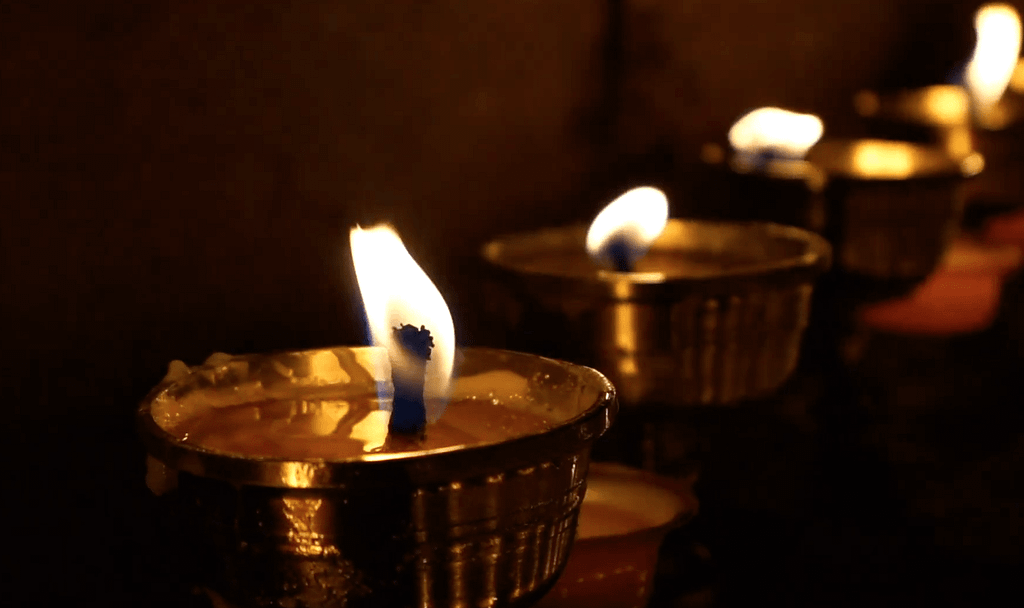
There is a word we come across in reading Tibetan Buddhist books, liturgies or philosophy that is both intriguing and enigmatic. Rig-Dzin literally means awareness-holder or knowledge-holder1. There are other words in that language that mean “being in possession of” or achieving a certain state or level. But here it literally means “holder.” So what is being held, who is holding it, and where is it being kept—and why? Like so many other pieces of spiritual jargon, the answer can only be unpacked with an in-depth experience of its meaning, not through simply thinking or reasoning cleverly about it. Coming to a deeper realization of its inner portent can be life-changing. I, like many other people I know and even care about, have spent many years, some a whole lifetime, in accumulating information about spiritual practices, theories, ideas, ideologies, history and so on. For the fortunate few, this information became knowledge. Information is something that sits on the outer fringes of our being, our Persona or “personality.” This is the formation that we acquire from infancy onward, made up of all the patterns, beliefs, memes, modes of feeling, thought and reactions, all the pre-packaged programs that culture and society will insert into our psyche. They are sophisticated and complex, forming a Persona that is meant to be the interface between your true, essential self, and the artificial culture we inhabit. It is to be the two-way filtration mechanism through which you receive information about the world, and express your inner being—your Essence. Persona is to be passive, while Essence if the actor, the real person with real thoughts and feelings, awareness and values. The Gurdjieff tradition describes this polarity more perfectly than any other source, yet ironically this truth is missed by the whole of modern Persona-based psychology. But it does happens often—it happens most of the time in our modern world—that Persona usurps the throne and becomes the false king or queen. Instead of our real self, our Essence, ruling our world, the made-up fabricated Persona takes charge. And that is a disaster for the inner growth of a person’s “soul,” their true biological, psychological, spiritual nature.

Information belongs to Persona. But knowledge is something that has entered you, become a part of your being, the fabric of your mind-body. You could say it integrates with our energetic DNA, our soul, our true self. It becomes part of Essence. However, even if you live a long and fruitful life, those particles of true knowledge are not such frequent visitors. There are not hundreds or even scores of them. In a life well-lived, there may only be a dozen things that we know from our core of certainty, that resonant with every atom of our being. And thus the rig-dzin, the knowledge-holder. Most people will accumulate information, good and bad, spiritual and worldly. Many of course will not pursue deeper knowledge of the world, of their human nature, of the meaning of life or the possibility of transformation. J. G. Bennett called such people psychostatic, as opposed to psychodynamic. But even for those that are fascinated, interested or involved with transformative information, esoteric subjects or religious traditions, it may not percolate into the core.
But when it does, and however much does, to that extent you become a Knowledge-Holder. You become a repository of sacred knowledge and of sacred being. That knowledge (not information) is a living energy, a living substance, a vital cosmic fluid. It is a matrix of meaning that will persist in the center of your Essence throughout life—and beyond this life. You are now a time capsule, waiting to be opened with that sacred knowledge, filtered and purified in the cauldron of the soul. Even if you never speak, write or pass on your knowledge in this life, it is not lost. That is the economy of spirit. Nothing of its nature is lost. Knowledge has a material and substantial nature. It is not infinite, but quite limited in quantity. And thus when the world becomes more mad, more insane even than usual and beings lose the small portion of sanity that they were alloted by birth, their grains of Essence knowledge are released and made available. It becomes essential that whatever free higher energies exist (even if never utilized) be collected for future generations, for the larger world and for cosmic balance itself. Thus we have the world of today, of 2022, where the sane few and the madness of crowds serve utterly different functions in the cosmic play of life. One discharges, the other collects, though neither of these can be seen with the naked eye or with logic. But the process does happen by the very nature of cosmic law, so you may catch a falling star if you are on the right side of the equation.

Worldly success is based on the accumulation of wealth, property, notoriety or other forms of status, depending on the society and sub-cultures in which a person lives and moves. It may involve the number of friends, well-wishers, loving family members and one’s place in the wider community. This becomes the measure of a man or woman. What one has produced is also a huge factor: books, techniques, technologies, companies, organizations, children. All these are considered one’s legacy. Some of it lasts, some does not. If the memory of someone goes beyond family and friends, and enters history, it becomes more a piece of cultural landscape than something tangible. As interesting or even inspiring as it may be, a story of glory or a cautionary tale, it is now just information. But beyond that, what one has distilled in the inner cauldron’s of one’s Essence survives well beyond personhood. It enters the realm of higher frequencies, not as just an energy of course, but a knowledge-being-frequency packet. This is recycled and re-used in a variety of ways. It can reach other seekers at other times, even in the distant future. This is part of the meaning, purpose and function of lineage, of a line of enlightened lineage-holders. We pray to them, connect with them, say mantras to evoke them, develop a mind of devotion to resonant with their non-dying Essence. But such packets of energy-information can reach us in more immediate forms. Practitioners of various disciplines—Buddhists, Sufis, Daoists, etc.—are aware of various states or mini-spiritual experiences (Tibetans call them nyam). But these can also occur to anyone who is sincerely moving along an evolutionary timeline, with or without some traditional affiliation. Artists, musicians and other creatives may get them too. But without that tradition-based context they will often not quite understand what to do with it, and it won’t land on the inside, but be swallowed up by Persona and Ego.
In truly extraordinary situations such powerful packets appear as treasures (Tibetan: terma) to be revealed at some far future time by highly developed beings. But each of us can get our “small terma,” insights appropriate to our stage and level. This is because among those nyam are what can only be called “downloads.” These are packets of knowing that have been accumulated within the energy streams we have nurtured; They become suddenly available based on our efforts and the special configuration of the time, planets, and cosmic forces about which we can only conjecture. And with that we have a moment of deeper cognition and feel a shift in the foundation, one that does not easily evaporate. So work, study, learn, allow the magic, power and struggle of a spiritual seeker, a being of light, to continue. Nothing accumulated, no matter how small, is wasted. Nor is it lost. If we die tomorrow, projects unfinished, words unspoken, the chimera of enlightenment, satori or moksha not accomplished, that is not failure. Not a thing that becomes a part Essence is for naught. Some will enter permanently into the crystalline photonic configuration that is the scaffolding of our light-body-to-be. And some will always be there waiting to be unpacked by other fortunate beings. Or by our future self.
References
Bennett, J. G. (1961). The Dramatic Universe: 2: The Foundations of Moral Philosophy. J. G. Bennett Foundation
Nicoll, M. (1996). Psychological Commentaries on the Teaching of Gurdjieff and Ouspensky, Vol. 1-4. New York: Weiser.
Ouspensky, P. D. (1965). In Search of the Miraculous: Fragments of an Unknown Teaching. New York: Houghton Mifflin.
Rigpa Shedra. Vidyadhara. Retrieved January 4, 2022, from https://www.rigpawiki.org/index.php?title=Vidyadhara
Shambala Times. 2018, November 18. What is Terma? Retrieved from https://shambhalatimes.org/2018/11/18/what-is-terma/
Wisdom Library. Vidyadhara. Retrieved January 4, 2022, from https://www.wisdomlib.org/definition/vidyadhara

Leave a Reply
You must be logged in to post a comment.